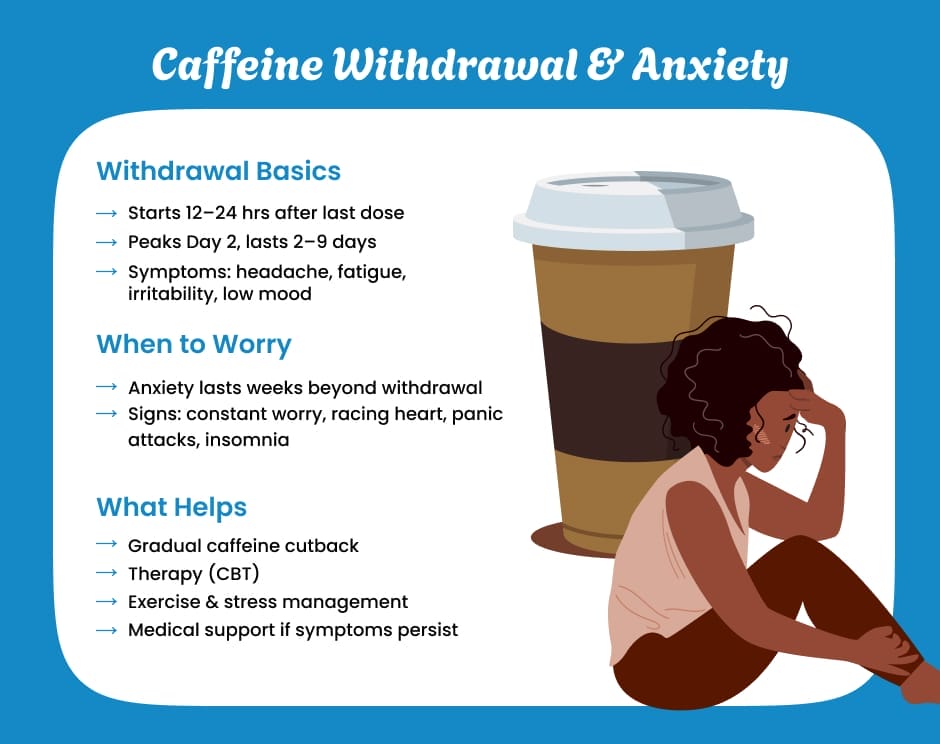For millions of people across the United States, a cup of coffee in the morning is their lifeline. It’s necessary. But what happens when caffeine intake becomes more than a habit? Sometimes, the line between caffeine dependence and genuine mental health concerns becomes blurred, especially when withdrawal symptoms evolve into something more serious.

Understanding Caffeine Withdrawal
Caffeine withdrawal is real. It’s a medical condition recognized by healthcare professionals around the world. When you regularly consume caffeine through coffee, tea, energy drinks, or other sources, your nervous system adapts to its presence. Your body becomes accustomed to functioning with this stimulant, and removing it suddenly can trigger a cascade of uncomfortable symptoms.
Most people experience withdrawal symptoms within 12 to 24 hours after their last dose of caffeine. These symptoms typically peak around day two and can last anywhere from two to nine days. The severity often depends on how much caffeine you consume daily and for how long.
Common withdrawal symptoms include:
- Severe headaches
- Fatigue and drowsiness
- Difficulty concentrating
- Irritability and mood changes
- Flu-like symptoms
- Depressed mood
When Withdrawal Becomes Something More
While most people experience temporary discomfort during caffeine withdrawal, some people develop more persistent anxiety symptoms that don’t resolve once the physical withdrawal period ends. This is when caffeine withdrawal can potentially trigger or unmask an underlying anxiety disorder.
The transition from normal withdrawal to an anxiety disorder often happens gradually. You might notice that despite weeks passing since your last cup of coffee, feelings of nervousness, worry, and physical anxiety symptoms persist. Your heart might race without caffeine, you may feel constantly on edge, or experience panic attacks that seem unrelated to your caffeine use.

The Science Behind Caffeine and Anxiety
Caffeine affects your nervous system by blocking adenosine receptors in your brain. Adenosine is a neurotransmitter that promotes sleep and relaxation. When caffeine blocks these receptors, you feel more alert and energetic. However, your brain compensates by creating more adenosine receptors over time.
When you stop caffeine consumption, your brain suddenly has too many adenosine receptors and not enough of the stimulant to block them. This imbalance can create feelings of overwhelming fatigue, but it can also trigger anxiety as your nervous system struggles to find equilibrium.
For some people, this neurochemical disruption doesn’t resolve quickly. The anxiety that begins during withdrawal can persist and develop into a diagnosable anxiety disorder, particularly in individuals who were already predisposed to anxiety conditions.
Risk Factors for Developing Anxiety Disorders
Several factors increase the likelihood that caffeine withdrawal might trigger a lasting anxiety disorder:
Previous Mental Health History
If you’ve experienced anxiety or depression before, you’re more vulnerable to developing an anxiety disorder during withdrawal. Past episodes of mental health challenges create pathways in your brain that can be reactivated during times of stress or chemical imbalance. Even if you’ve been symptom-free for years, the disruption caused by caffeine withdrawal can trigger the return of familiar anxiety patterns. Understanding your mental health history helps healthcare providers create more effective treatment plans tailored to your specific vulnerabilities.
High Caffeine Intake
People who consume large amounts of caffeine daily—whether through multiple cups of coffee, energy drinks, or supplements—face higher risks. Regular consumption of more than 400 milligrams daily (roughly four cups of coffee) creates stronger physical dependence and more severe withdrawal symptoms. Energy drinks often contain additional stimulants beyond caffeine, which can complicate the withdrawal process and increase anxiety symptoms. The more your nervous system relies on caffeine to function normally, the more dramatic the adjustment period becomes when you stop.
Genetic Predisposition
A family history of anxiety disorders can make you more susceptible to developing anxiety during the withdrawal process. Genetics plays a significant role in how your brain processes neurotransmitters and responds to stress. If close relatives have struggled with anxiety, panic disorders, or depression, you may have inherited similar brain chemistry patterns. This genetic vulnerability doesn’t guarantee you’ll develop an anxiety disorder, but it does mean you should approach caffeine withdrawal with extra caution and professional support.
Stress Levels
High stress in your personal or professional life can compound withdrawal symptoms and increase anxiety. When you’re already dealing with work pressures, relationship challenges, or financial concerns, your nervous system is operating at heightened levels.
Adding caffeine withdrawal to existing stress can overwhelm your coping mechanisms and trigger persistent anxiety symptoms. The timing of when you choose to reduce caffeine consumption can significantly impact your success and mental health outcomes.
Other Substance Use
Using alcohol or other substances alongside caffeine can complicate withdrawal and increase mental health risks. Many people don’t realize how these substances interact and affect their nervous system’s baseline functioning.
Alcohol, in particular, can disrupt sleep patterns and mood regulation, making caffeine withdrawal more challenging. If you’re taking medications, using nicotine, or consuming other stimulants, these factors can all influence how your brain responds to the absence of caffeine.
Recognizing the Signs
Understanding when caffeine withdrawal has crossed into anxiety disorder territory requires paying attention to both the timing and severity of symptoms. Normal withdrawal symptoms should begin improving within a week. However, if you experience the following symptoms for several weeks after stopping caffeine, you might be dealing with an anxiety disorder:
- Persistent worry about everyday situations
- Physical symptoms like rapid heartbeat, sweating, or trembling
- Difficulty sleeping that continues beyond the initial withdrawal period
- Avoiding situations that previously didn’t cause anxiety
- Panic attacks that occur regularly
- Depressed mood that doesn’t improve
- Difficulty functioning in work, social, or family situations

Treatment Approaches
If caffeine withdrawal has triggered an anxiety disorder, professional treatment can help. Many people benefit from a combination of therapeutic approaches tailored to their specific needs.
Therapy Options
Cognitive-behavioral therapy (CBT) is particularly effective for anxiety disorders that develop following caffeine withdrawal. This approach helps you identify and change thought patterns that contribute to anxiety, teaching you practical skills to manage symptoms in daily life. CBT also addresses any catastrophic thinking patterns that may have developed around physical sensations during withdrawal.
Many people find that therapy helps them understand the connection between their caffeine use and anxiety, empowering them to make informed decisions about their future relationship with caffeine.
Medical Evaluation
A healthcare provider can assess whether medication might be helpful for managing persistent anxiety symptoms. Some people benefit from short-term anti-anxiety medications to help stabilize their nervous system during the recovery period. Others may need longer-term treatment with antidepressants, particularly if they’re also experiencing a depressed mood or have a history of depression. Medical evaluation is especially important if you’re having thoughts of self-harm or if anxiety is significantly impacting your ability to function in daily life.
Lifestyle Modifications
Gradually reintroducing small amounts of caffeine might help some people, though others do better remaining completely caffeine-free. Regular exercise becomes particularly important as it naturally boosts mood-regulating neurotransmitters and helps manage anxiety symptoms. Establishing consistent sleep schedules, practicing stress management techniques like meditation or deep breathing, and maintaining social connections all support nervous system recovery.
Nutrition also plays a role, as blood sugar fluctuations can worsen anxiety symptoms during this vulnerable period.
Gradual Caffeine Reduction
For future reference, slowly reducing caffeine intake rather than stopping abruptly can prevent severe withdrawal symptoms and reduce the risk of triggering anxiety disorders. Try switching to decaffeinated coffee gradually, mixing regular and decaf in increasing ratios over several weeks.
You might also consider switching from high-caffeine energy drinks to lower-caffeine alternatives like green tea before eliminating caffeine entirely. This approach gives your nervous system time to adjust gradually, reducing the shock to your brain chemistry and minimizing the risk of persistent anxiety symptoms.
The Path Forward
Developing an anxiety disorder following caffeine withdrawal doesn’t mean you’re weak or that you’ll never feel normal again. With proper support and treatment, most people see significant improvement in their symptoms. The key is recognizing when professional help is needed and taking steps to address both the immediate anxiety and any underlying factors contributing to it.
Recovery is possible, and you don’t have to navigate this challenge alone. Mental health professionals understand the complex relationship between substance use—even seemingly harmless substances like caffeine—and anxiety disorders. They can provide the tools and support you need to regain control of your mental health.
If you’re struggling with persistent anxiety after stopping caffeine consumption, reach out for help. Early intervention often leads to better outcomes and can prevent symptoms from worsening over time. Your mental health matters, and effective treatment options are available to help you feel like yourself again.
